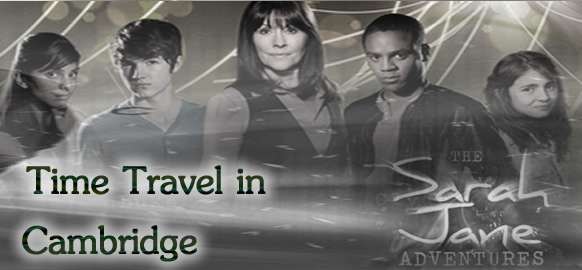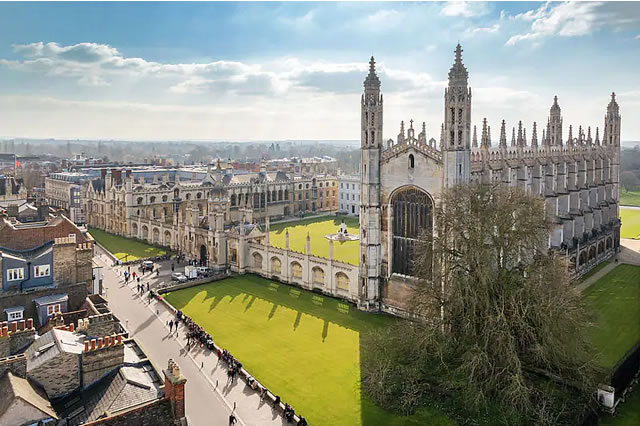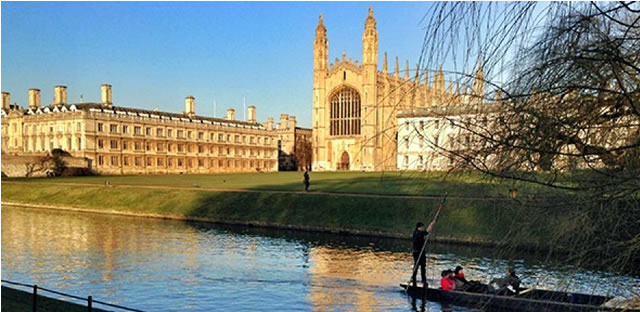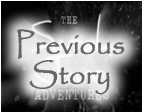 #
#

Sarah-Jane Smith had never been so nervous in a life of nerve-wracking experiences. Even interviewing King Charles – when he was still Prince of Wales, hadn’t been this bad. After all, that had really just been him and her in armchairs, with tea. Well, a couple of equerries by the door, but mostly it was just the two of them, and he had been polite and smiling as he poured tea for her.
There was a carafe of water and a glass on the lectern beside her, but the fact that both were expensive lead crystal only added to her nervousness as she stood up in front of five hundred eager listeners in the Lady Mitchell Hall, Cambridge.
She had been invited to give a lecture on her prestigious life as an investigative journalist. She knew the suggestion had probably come from her son, Luke, who was now firmly established as a professor of archaeology – one of the youngest ever to hold such a post. But it took several senior members of the faculty to agree to the idea. It WAS a huge honour to be asked.
But public speaking on this scale wasn’t something she did very often, and she WAS nervous.
She took a deep breath and looked about the hall. She caught sight of Luke and his boyfriend, Pieter, in the second to front row. Both were grinning, though she wasn’t certain they were grinning at her.
She pressed the little remote control button in her hand that turned on the big screen behind her. The image appeared on a small screen on the lectern, too. It was a picture of herself, too long ago, outside the old Fleet Street headquarters of the Guardian.
She began her lecture.
An hour and a half later, the water in the carafe was much lower and the lecture was over. Nothing had gone wrong. People had laughed at the few jokes she had fitted in. They gave her a standing ovation. The Chancellor of Cambridge University shook hands with her.
She had met him briefly earlier at an afternoon event with drinks and buffet food. He was Lord Sainsbury of Turville, something to do with the supermarkets, and a retired politician, and knew more about her than she knew about him.
There was another drinks and fiddly finger food reception afterwards, this one much bigger and noisier. She was introduced to a lot more people with ‘lord’ or ‘lady’ in their titles, including two more formerly connected to supermarkets. They were all starting to look and sound alike to Sarah-Jane when Luke rescued her.
“There’s some people I need you to meet,” he said.
“Oh no,” she groaned. “Not you, too. I can’t bear another Lord Aldi of Grimly.”
Luke was puzzled.
“Aldi is a German company. Its owners wouldn’t qualify for the British Honours system. Anyway, this is nobody like that. Come on, mum.”
Being called ‘mum’ helped. She had been introduced all evening as Doctor Smith. The title was on account of an honorary doctorate that she had been awarded by the London School of Economics two years ago. It was a title she never used. Not that she wasn’t pleased with an award she had missed out on because she started her journalist career so young and didn’t have chance to do any postgraduate studies. That was fine. She had almost certainly earned it.
But Doctor Smith, to her, was a very different person. It just felt wrong. Luke preferred to be called ‘professor’ than ‘doctor’ for much the same reason.
He brought her to a side room with comfortable armchairs and tea and sandwiches set out on a table.
“This is Keith Garfield and Sam Fitzpatrick, both of them physics postgraduates working on a project you are almost certainly going to disapprove of. If I’d known what they were up to, I’d have said something, but they kept their plans rather secret.”
“We had to,” Keith protested. But Sarah-Jane missed the rest of his explanation. She was looking at the woman who sat with the two young men.
She wasn’t young. She was probably in her late fifties. She was tall, dressed in a neat, conservative skirt suit, long silvery-blonde hair in a bun.
And Sarah-Jane knew her.
“You were at the Brigadier’s funeral,” she said, remembering a sad day, more than a decade ago now. Most of the mourners were in uniform, some not worn since retirement from the army, but squeezed into one more time to honour a great man.
“You’re....” The memory was hard work, but she got there in the end. “Elizabeth Shaw... Doctor Elizabeth Shaw....”
“Most people just call me Liz,” she answered. “And... Yes, the Brig’s funeral is where we met. Just that one time. But we both knew HIM, of course.”
The ‘HIM’ didn’t refer to Brigadier Alistair Gordon Lethbridge-Stewart, but the man who linked them all – The Doctor.
The two women looked at each other and said nothing, because they didn’t need to say anything. Mention of The Doctor gave them both a strangely difficult lump in the throat moment, even though they knew he, or possibly she, was still alive, somewhere.
“But....” Sarah-Jane pointed out, though she felt it was somehow rude to do so. “Well... You worked with him... with both of them... before I did. You... should be at least ten years older than me. And I’ve been collecting my pension for a while now...”
“Yes,” Liz said. “That’s something these two young men have to talk about. I can’t. This is.... Twenty-twenty-four. I checked earlier.... I disappeared twelve years ago. I’m a cold case in Cambridgeshire Constabulary’s files.”
Sarah-Jane Smith wasn’t sure what, exactly to say. She looked at the two postgraduates, both of whom looked desperate to tell their side of the story.
“It’s all my fault,” Sam admitted. “It was my research. Well, some of it, anyway. It was my design, my device, built from it. I got Keith involved. And Doctor Shaw. I totally disrupted HER life. I’m sorry about that. Anyway, I told Luke about it all, because he does have a bit of a rep for weird stuff. And he said this was right up your street.”
“A ‘rep’ for weird stuff?” Sarah-Jane looked at her adopted son. Having been created by aliens as a means to cause havoc on planet Earth he WAS weird stuff, but she didn’t know it was common knowledge around Cambridge.
“Let Sam tell his story,” Luke said in a measured tone.
Sarah-Jane sipped tea, almost in tandem with Liz Shaw. Sam cleared his throat hesitantly. If she had brought up an ordinary boy from birth rather than a genius cloned by aliens, and who had never learnt human subterfuge, she might have more easily recognised the body language of a boy with a guilty conscience –even a boy in his early twenties with a degree under his belt.
“I was looking through the undigitised archives of the physics department,” he said. “About a year ago. There are mountains of handwritten or typed theses and research notes going back to the sixties. Most of the notes were by past professors doing vanity projects without any actual oversight by the department.”
“Vanity projects?” Liz Shaw objected to the term very strongly. “Far from that. I think you’ll find many of the great discoveries of science were done by people who didn’t need to be held back by ‘departmental oversight '. Crick and Watson’s work on DNA, Sir Timothy Berners Lee inventing the thing you youngsters take for granted – the internet. Neither needed anyone coming along to question where the work was going and what use it was going to be to anyone.”
Everyone in the room knew of those two examples of very useful gifts to Humankind. Sarah-Jane nodded to Liz, then encouraged the young man to continue his story.
“Well....” he continued. “I found a very detailed set of papers about what I can best explain in lay terms as ‘temporal soft spots’.” He looked at Sarah-Jane, the only non-scientist in the room. “That is...”
“Naturally occurring geographical positions where time is fluid and, possibly with some technical help, a person might pass from one time to another,” Sarah-Jane suggested to his astonishment. “Yes, I quite understand what you are saying. It is something Humans really shouldn’t get involved in. At least not without a very specific kind of oversight.”
Liz Shaw nodded imperceptibly and smiled wryly.
“You think so, too?” Sam asked. “I thought... Somebody outside the strict scientific thinking... might be more empathic.”
“I have more empathy than you think,” Sarah-Jane answered him just a little acerbically.
“This is REAL,” said Keith, his first word on the subject. “I know there are some films and television programmes about people finding ways to time travel. Silly stuff, most of it. But this is REAL. Sam built a device to find the ‘soft spots’ and we went through them.”
Sam gave him a strange look, half irritated by his outburst, half grateful that he had explained in a few words what he might have taken a good half an hour to go through in strict scientific detail.
“The notes pointed the way, but it was obvious no practical testing had been done. It actually looked as if there had been some kind of prohibition on continuing beyond the theory to the practical.”
“So you decided to ignore the prohibition?” This time Sarah-Jane shortened the explanation by some time. It was late in the evening, after all.
Nobody noticed the censure in her question.
“There was a bit more work to do. The notes... needed some correction.”
Sam sounded just a little bit smug, then. He had corrected the work of somebody probably much higher qualified than he was.
“It didn’t take long, really. Then there was nothing to be done but to design and build a portable device that would detect the ‘soft spots’ and... as it were... open them up.”
“That’s where I came in,” Keith admitted. “I’m more of a gadget man... Building things from scratch. I had to alter Sam’s blueprint a bit. What he originally designed would have weighed half a ton. Hardly portable. I was able to do it with smaller, lighter components... A bit more technological era, less steampunk.”
Sarah-Jane couldn’t help smiling at the term ‘steampunk’. It always seemed to be a term coined by somebody who had actually met The Doctor. It certainly fitted that adorable white haired version she and Liz had both known, who could turn a canteen of cutlery into a radiation detector.
But the two ‘culprits’ were continuing their story.
“We built it, and, of course, we had to test it,” Sam explained. “What’s the point of science otherwise? So we took it out, walked all over Cambridge....”
“We looked like we were playing Pokémon Go,” Keith admitted. “And some of our earlier results were just as trivial. The time differences were only a few minutes. I went through one in the botanical gardens while Sam waited. Our watches were three minutes out when we compared them. Another time, outside the Observatory, we both went through and emerged twenty seconds earlier, in time to see ourselves vanish.”
“There are obviously many micro-spots,” Sam concluded. “But we had no way of measuring them. We went back to the research for several days and refined the device to ignore the micro-spots and look at much longer ones, going back days, rather than minutes.”
“Only we made two mistakes,” Keith said.
“Not exactly mistakes,” Sam protested out of pride more than anything else. “Just....”
“Miscalculations,” Keith said. “Decimal points in the wrong places. But definitely MISTAKES. We might as well admit it. We made mistakes. First, we misread days for decades. And second... unlike the people in the fictional time travel, we didn’t consider whether the soft spots went both ways.”
“Oh dear,” Sarah-Jane considered. Going back two or three days, maybe even a week, wouldn’t be so bad. They could go to the seaside and wait to catch up with themselves. Going forward in time a short way would be even easier. They would just have to fake a sick note to explain their absence or some such excuse.
“How far back did you go?” she asked.
“July 1966,” Keith admitted. “July 30th, to be precise.”
“World Cup Final day,” Luke said, because that was the sort of thing he was good at.
“I hope you didn’t put a bet on the result,” Sarah-Jane admonished. “Liz and I both know somebody who would be very cross about that. He’d call it interfering with causality.”
“Unless it suited him to do it, of course,” Liz pointed out.
“Well we couldn’t, even if we’d thought of it,” Sam answered, ignoring the knowing looks from the two women. “We had no money. Only one totally anachronistic fifty pence piece with the King’s head on it. I had that as a sort of souvenir, in my jacket pocket. I don’t know anyone who carries cash since the local buses started taking swipe payments. So there we were. The whole of Cambridge was having a holiday, drinking and celebrating in every pub and cafe, student lodging and private house. And we only managed to get a drink of water because there were still a couple of old Victorian fountains in the streets back then.”
“Poor things,” Sarah-Jane said with genuine sympathy. “So what did you do?”
“Panicked,” Keith answered. ”Because it was then that we found out that we couldn’t go back by the same soft place.”
“I am about eighty percent sure that the act of passing through collapsed the... For want of a better word.... portals,” Sam continued. “We searched for another soft place. Pretty desperately, really. It actually dawned on us then that getting home might not be easy. Party night or not, we really couldn’t imagine having to live in that time. Our mums weren’t even born. We had no qualifications to get back into university. No references to get any kind of job. We were pretty scared, actually.”
“We eventually found a viable soft place in King’s College Chapel,” Sam continued. “Right beside the high altar. We came out in the same place in 1970, as we found out a bit later. When we bought a newspaper.”
“You acquired money?” Sarah-Jane queried.
The two of them looked uncomfortable about that question. Sam eventually explained why.
“It was early evening and a service had just finished. There was nobody there, but there was a smell of recent incense burning and... the sort of silence that comes after there had been noise not long ago. I know... Not at all scientific. But that’s how it felt. It was beautiful. Which made what we did then even more terrible. Something neither of us would have done, but we were really hungry now.”
“Time travel might have an affect on the body,” Keith explained. “Loss of proteins and salts.”
Sarah-Jane considered how often she had felt hungry in the TARDIS. There might well be something in that. She wondered about the terrible thing the pair had done.
“We swiped the money from the offertory plate on the altar,” Sam admitted. “There was what turned out to be a ten shilling note and lots of coins neither of us recognised. We ran for it and found a small restaurant nearby. It was a bit confusing. I have never even seen pre-decimal money. Some of the coins actually had the old King’s head... George VI. We weren’t even sure it was still legal tender. And we didn’t know what any of it was worth in real terms. We had no idea if we had enough to pay for a meal.”
“I remember going decimal,” Liz said. “The new money confused me back then. But now, I would struggle with the old pounds, shilling and pence.”
“I was at school,” Sarah-Jane admitted. “We did lessons in maths to get us ready for ‘D-day.’ Actually, those old shillings, even the King George VI ones, counted as five and ten pence pieces right up until the early eighties, when they changed the size of the coins and brought in twenty pence pieces.”
“Well, it WAS enough,” Sam admitted. “We had a good meal. It wasn’t quite enough for a b&b for the night. That was our next transgression. We snuck out early without paying. Before anyone might have noticed, we’d found another ‘soft spot’ and got out of there.”
“The b&b is a retro clothes shop now,” Keith said. “But we’re going to send a donation to the chapel. And the RSPB.”
“What does the RSPB have to do with anything?” Sarah-Jane felt compelled to ask.
“We came out in 1974. The change from dinner in 1970 was no good for anything except a chocolate machine that accepted the shillings. We... Well, we’d stolen from a church, so grabbing a collection box for wild birds was no worse. As it happened we didn’t stay long. We found another ‘soft spot’ and went through it. We emptied the box sitting on a park bench in Jesus Green. Near the swimming pool. There was a fair bit of inflation between 1974 and 1980. The money for the birds didn’t go very far. But we got some food and slept in the park for an hour or two. Then looked for the next soft spot going forward in time.”
“All this petty theft is worrying,” Sarah-Jane said. “I don’t think anyone imagined time travel leading to that.”
“It wasn’t the last time, I’m afraid,” Keith admitted. “The next place was outside the Corpus Christi dining hall. The huge gothic place. We came out in the middle of the night, but there was obviously going to be a big banquet the next day. There was all sorts of food in the kitchen. We filled a couple of bags with meat and cheese and fruit and ran for it. We ate most of it before we tried another soft spot, because we wondered if we could take food with us. Would it go rotten?”
“That’s actually a very good question,” Sarah-Jane said. “I’ve never thought about it.”
“Well, we kept a couple of apples and they made it to 1994,” Keith said. “We ate them sitting outside the Fitzwilliam Museum. They were still fresh. I don’t know whether that counts as a scientific discovery... Or grounds for sectioning us under the Mental Health Act.”
Sarah-Jane recalled that her first time trip was to the Middle Ages. Being burnt at the stake for witchcraft had been a possibility. But she didn’t feel inclined to swap anecdotes with these two. With Liz Shaw, later, perhaps. But she wasn’t sure about the Bill and Ted of Cambridge.
“That was the worst,” Sam admitted. “It took us two weeks to find another soft spot. We stole another couple of poor boxes from churches and some jeans and t. shirts from a washing line, and slept in the botanical garden. We wondered if we could live in the past. But we hadn’t even been born in 1994. Cambridge looked pretty much as it does now...but there were subtle differences. Enough so that it didn’t feel like we belonged. It was a bit frightening. We wondered what might happen when we caught up... We’d be in our fifties by now. It was too much to think about.”
“It might have been the sensible thing to do,” Sarah-Jane pointed out to them. “You must have realised by this point that time travel is a difficult, even dangerous undertaking. Staying put – even if it meant getting mundane jobs outside the safe, comforting walls of these ivory towers, might have been better for everyone.”
“I worked hard for my degree,” Keith protested. “More to the point, my mum worked two jobs to afford to send me to Cambridge. She was proud when I graduated and won a bursary to continue studying. The estate I grew up on, people don’t get letters after their names. They’re too busy trying not to get a prison number.”
“I’m from a better estate,” Sam added.” But university was hard work for me, too. It’s not just academic snobbery that made us dread the idea of a minimum wage job. And... What would our families go through if we just went missing with no explanation.”
“Yes....there is that,” Sarah-Jane admitted. Nobody had really missed her when she went time travelling with the Doctor. Her only living relative, Aunt Lavinia, went missing in strange parts of South America all the time. She barely noticed that her niece wasn’t home.
But these two young men had realised the personal cost of their actions, if not the scientific implications.
“So... What happened next?”
“We found a spot in the Botanical Gardens. We got as far as 1998. But we didn’t stay long. We found another spot in only twenty minutes. That brought us to 2004.”
“You found another soft spot very close to the one you just came out of... And that was the second time you found one in the Botanical Gardens.”
Sarah-Jane and Liz exchanged glances. They were both wondering what gave the Botanical Gardens such a cluster of these soft spots. Both had similar thoughts about it.
U.N.I.T. need to look into the Botanical Gardens.
“2004 was still no good to us,” Sam pointed out. “We had to keep on trying.”
“We were actually there for the 2004 graduation ceremonies,” Keith said. “We used our Student Union cards to get into a couple of parties... For the free food. We hung about afterwards to get hold of as many leftovers as we could, and then looked for another soft spot.”
“We arrived next in 2012. In the middle of the Olympics. We joined an outdoor party watching some of the events on a big screen and ate the food from 2004 and then filled our bags up again in case we weren’t so lucky with food next time.”
“Then we had the idea of looking up the scientist who wrote the original paper,” Keith said. “Again, our student cards got us into the library so we could find the details. We found out that Doctor Shaw had retired two years before. But she still lived locally. In a nice cottage in the countryside.”
“Which is where I came into this,” Liz admitted. “These two came to my door with their story. I was absolutely astonished... And angry. At them for being so stupid, and the Physics department for archiving that paper. I thought I’d destroyed everything to do with this project.”
“You were researching time travel at Cambridge?” Sarah asked her in some surprise. “Surely you, of all people, know how dangerous it is.”
“I do,”Liz said. “The new boss of U.N.I.T asked me to look into it... Just after her father’s funeral.”
“Kate Stewart, you mean?” Sarah-Jane queried. “I would have expected her to have more sense, too.”
“That’s why she asked me to do it, on my own, no postgraduate assistants or anything. I spent a year on it. And then told Kate my findings were too dangerous. We agreed that I should destroy everything - on any computer or cloud storage or thumb drive, every bit of paper. EVERYTHING. I don’t know HOW the handwritten copy of my report got into the archive. Nobody should EVER have seen what I’d found out – that time travel was possible through these natural temporal interstices.”
“Soft spots,” Sam said with an ironic tone. “Easier to say. Very hard to actually do. Mainly because it is so hard to get back again.”
“The biggest danger to them, at this stage, was finding an interstices that would take them too far into their own future. That would be as disastrous as being trapped in their own past. Which is why I had to help them. Which was, on reflection, a mistake. The fact that I had arthritis in both knees and was in no way fit for walking around Cambridge for hours was the first thing. Then I was daft enough to take five hundred pounds out of my bank to cover their food and other expenses. They badly needed clothes. Walking around for days on end, sleeping rough – if I was going to be seen in their company they certainly needed clothes.”
“We didn’t mean to get Doctor Shaw any further involved. She really wasn’t meant to go through the next soft spot. We’re not sure why it happened.”
“Artron energy,” Sarah-Jane guessed. Liz nodded sadly but didn’t explain anything more.
“We came out again in 2020,” Sam explained. “Lockdown.”
“I was terrified,” Liz admitted.” I thought it was some kind of dystopian alternative world. All the signs about social distancing and a big NHS tent on The Backs. The truth, when the boys explained how they’d lived through it all actually felt to me more terrifying than the things I'd been imagining. And with people being told not to go outside without good reason the three of us must have looked suspicious wandering the streets.”
“Three days, searching for another soft place to get out of the nightmare year. And even with Liz’s money we couldn’t get a hotel or a hot meal at a restaurant or anything. It was bad enough the first time round when we at least had rooms at the University. Thank goodness we found a way out.”
“Which brought us back two weeks ago,” Liz Shaw explained. “Thay was close enough. We went to my cottage. We used some of the cash we had left to get electricity on my meter. All my bank accounts were frozen by the police investigating my disappearance.”
“We used the rest to order takeaway food in our own’lockdown,” Keith laughed hollowly. “For two weeks when we might have run the risk of meeting ourselves. Doctor Shaw insisted that would be dangerous. Especially if we persuaded ourselves not to continue our experiments. That would have caused a paradox that could unravel time itself.”
“Pretty much,” Sarah-Jane agreed.
“So... anyway, it’s two days since we ‘left’. We were wondering how to re-enter society and... What Doctor Shaw should do. And that was when she found out that you were giving a lecture. Doctor Shaw remembered you. She said we ought to talk to you before we did anything else. So we told Luke we needed to meet you. When we told him a bit about it all, he agreed. And... Here we are.”
“Well,” Sarah-Jane said. “I can see why Liz would suggest that.”
“We couldn’t,” Sam admitted. “You’re a top journalist, but you’re not a scientist.”
“I am the best this world has as an expert in time travel,” Sarah-Jane answered. “And still an affiliate member of U.N.I.T. I suppose that’s why you thought of talking to me, Liz?”
“Exactly that. They need to know that part of my work wasn’t destroyed, and that these two have worked on it.”
“They’ll want to destroy my work,” Sam pointed out.
“OUR work,” Keith corrected him.
“MY work,” Liz Shaw said. “Which you used without my permission. I COULD sue you for plagiarism, but I don’t think making this whole thing public knowledge would be advisable. U.N.I.T. are the people to deal with this once and for all. I’ll let them know I don’t want you punished.”
“Can they punish us?” Keith asked. “If you can’t take us to court for plagiarism, they can’t touch us, either, without our story going public.”
“U.N.I.T. have a secret government prison that bypasses the justice system,” Sarah-Jane said, to the horror of the two culprits. “But we’ll both put in a word for you, as long as you assist in the complete obliteration of your device, your notes and every byte of computer drive involved.”
“All right,” Sam reluctantly agreed. So did Keith.
“I could do with U.N.I.T.’s help to get my life back,” Liz Shaw said. “Getting my bank accounts live again and cancelling out the missing persons case with the police.”
“Kate’s been promoted out to Geneva,” Sarah-Jane told her. “But the new lady in charge will help you, I’m sure.”
“Another lady in charge!” Liz Shaw laughed. “I’m not sure what the Brigadier would make of that. Bless his chauvinistic soul.”
“Absolutely,” Sarah-Jane agreed. “You’ll be all right carrying on with twelve missing years?”
“I’m not stepping one foot into anything to do with time travel. Not even if it’s blue and phone box shaped. I’ll just go back to enjoying my retirement. At least I’ve missed that whole COVID thing. And I need to get used to singing God Save the King. Apart from that, I think I’ll be all right. And anyway, I’ll want to keep an eye on these two in case they have any other ideas that twist the laws of physics out of shape.”
“We won’t,” Keith and Sam both assured her, but Sarah-Jane thought she was right to be wary. Time travel was rather like an addiction. It was painful getting used to life without it. They might need help to go cold turkey.
“Right, that’s enough for me,” she said. “The university paid for a very nice hotel suite. I think I’m going to enjoy it. Call me tomorrow, Liz, and we’ll meet the khaki tornado of U.N.I.T. together.”
“Yes, indeed,” Liz agreed.

 |
 |
 |